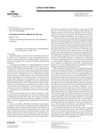 April 2024 in “Frontiers in microbiology”
April 2024 in “Frontiers in microbiology” Certain gut bacteria may increase or decrease the risk of male pattern baldness.

Early-onset baldness is linked to genetics, lifestyle, and can indicate higher risk for heart and metabolic diseases, and affects mental health.

N793 may improve hair density in people with mild hair thinning.

Changes in gut and skin bacteria are linked to different hair loss conditions, and treatments like fecal transplants and probiotics might help, but more research is needed.
 June 2023 in “Skin Research and Technology”
June 2023 in “Skin Research and Technology” The supplement with amino acids, iron, selenium, and marine hydrolyzed collagen improved hair growth more than drug treatment alone, with most people tolerating it well.

There are many treatments for common hair loss, but more trials are needed to decide which are best.
December 2022 in “Frontiers in Microbiology” The scalp microbiome is more diverse and may be more important in hair loss than the gut microbiome.
December 2022 in “PubMed” Altered hormones and insulin resistance are common in young men with early hair loss and linked to more severe cases.
 11 citations
,
November 2022 in “JAMA dermatology”
11 citations
,
November 2022 in “JAMA dermatology” Some nutritional supplements may help treat hair loss with generally mild side effects.
17 citations
,
November 2021 in “Journal of Cosmetic Dermatology” Combination therapies for androgenetic alopecia work best but can have significant side effects and costs.
 10 citations
,
August 2019 in “The World Journal of Men's Health”
10 citations
,
August 2019 in “The World Journal of Men's Health” Kimchi probiotics slightly improved hair density, but more research needed.
48 citations
,
May 2018 in “Expert Opinion on Therapeutic Targets” Gut health may influence Alopecia Areata, suggesting new treatments.
 1 citations
,
January 2018 in “Acta dermatovenerologica Alpina, Pannonica et Adriatica (Tiskana izd.)”
1 citations
,
January 2018 in “Acta dermatovenerologica Alpina, Pannonica et Adriatica (Tiskana izd.)” The herbal extract was found to effectively reduce and prevent hair loss without any side effects.
24 citations
,
January 2018 in “Indian Journal of Dermatology, Venereology and Leprology” Androgenetic alopecia is mainly caused by genetic factors and increased androgen activity, leading to hair follicle miniaturization.
 1 citations
,
December 2017 in “Skin appendage disorders”
1 citations
,
December 2017 in “Skin appendage disorders” Biotin may help women with hair loss who have low biotin levels, but more research is needed.
 178 citations
,
April 2017 in “Journal of The American Academy of Dermatology”
178 citations
,
April 2017 in “Journal of The American Academy of Dermatology” Minoxidil, finasteride, and low-level laser light therapy effectively treat hair loss.
 153 citations
,
March 2017 in “Endocrine”
153 citations
,
March 2017 in “Endocrine” Male pattern baldness involves genetics, hormones, and needs better treatments.
 15 citations
,
January 2017 in “JAMA Dermatology”
15 citations
,
January 2017 in “JAMA Dermatology” Topical minoxidil improves female pattern hair loss, finasteride not effective, laser devices show mixed results.
 78 citations
,
January 2017 in “Skin appendage disorders”
78 citations
,
January 2017 in “Skin appendage disorders” Biotin supplements may improve hair and nail growth in people with certain deficiencies or conditions, but there's not enough evidence to recommend it for healthy individuals.
 33 citations
,
January 2016 in “Indian Journal of Dermatology, Venereology and Leprology”
33 citations
,
January 2016 in “Indian Journal of Dermatology, Venereology and Leprology” Taking 1 mg of finasteride daily can increase hair count and improve hair appearance, but it may have side effects on sexual function and a potential risk of prostate cancer. It may not be effective for postmenopausal women unless taken in higher doses.
 30 citations
,
January 2014 in “Annals of Dermatology”
30 citations
,
January 2014 in “Annals of Dermatology” Scalp dermatoscopy helps diagnose and monitor hair loss severity.
 35 citations
,
February 2012 in “Journal of The American Academy of Dermatology”
35 citations
,
February 2012 in “Journal of The American Academy of Dermatology” Finasteride significantly improves hair growth but may cause sexual side effects.
 269 citations
,
August 2002 in “Journal of The American Academy of Dermatology”
269 citations
,
August 2002 in “Journal of The American Academy of Dermatology” 5% minoxidil works better for hair growth and density, with minor irritation.
 83 citations
,
December 2001 in “Journal of Investigative Dermatology”
83 citations
,
December 2001 in “Journal of Investigative Dermatology” Minoxidil boosts hair growth by targeting adenosine and possibly sulfonylurea receptor 2B.
 129 citations
,
October 2000 in “British Journal of Dermatology”
129 citations
,
October 2000 in “British Journal of Dermatology” Finasteride helps increase hair growth in men with hair loss.
























